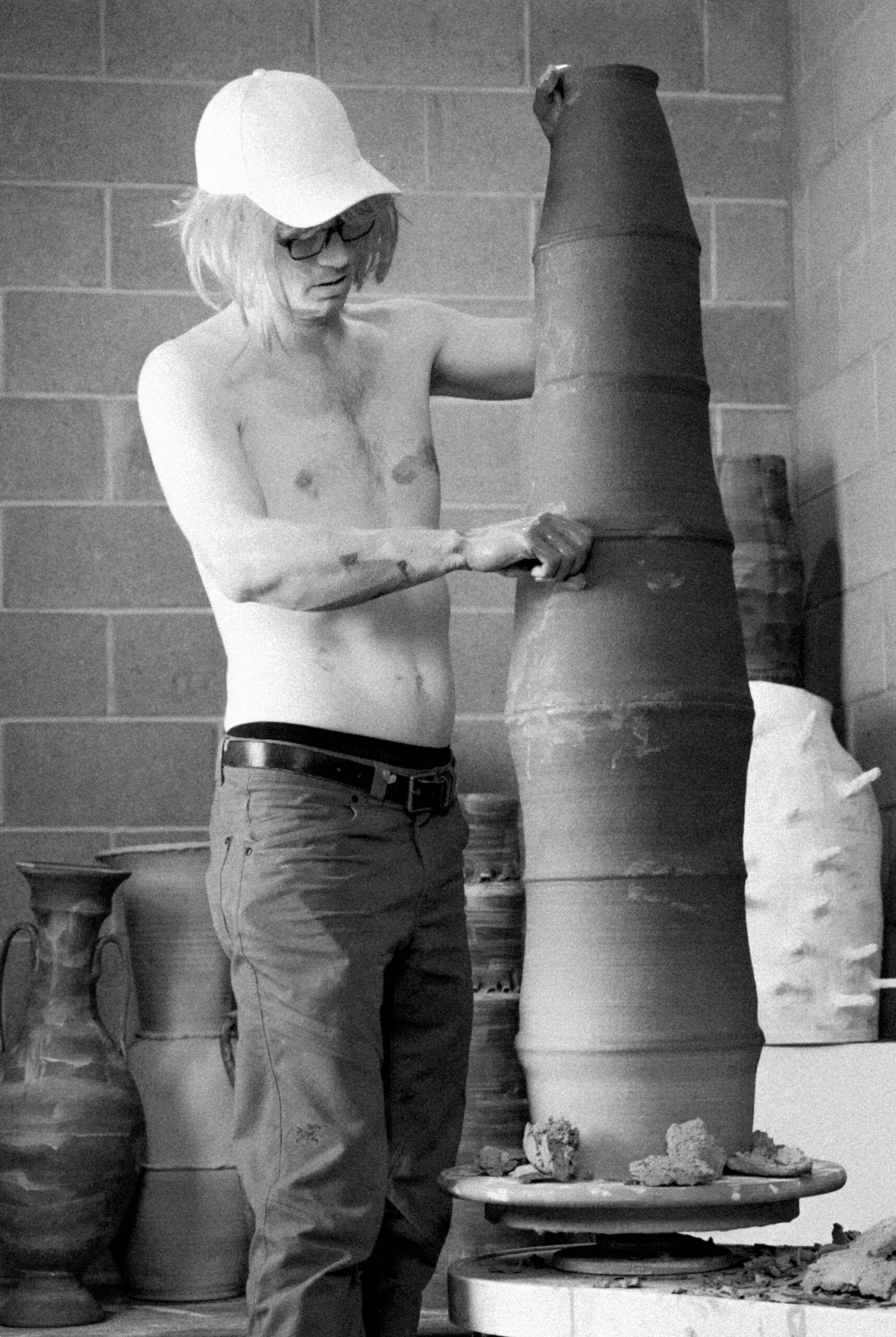„Portrait Of The Artist“
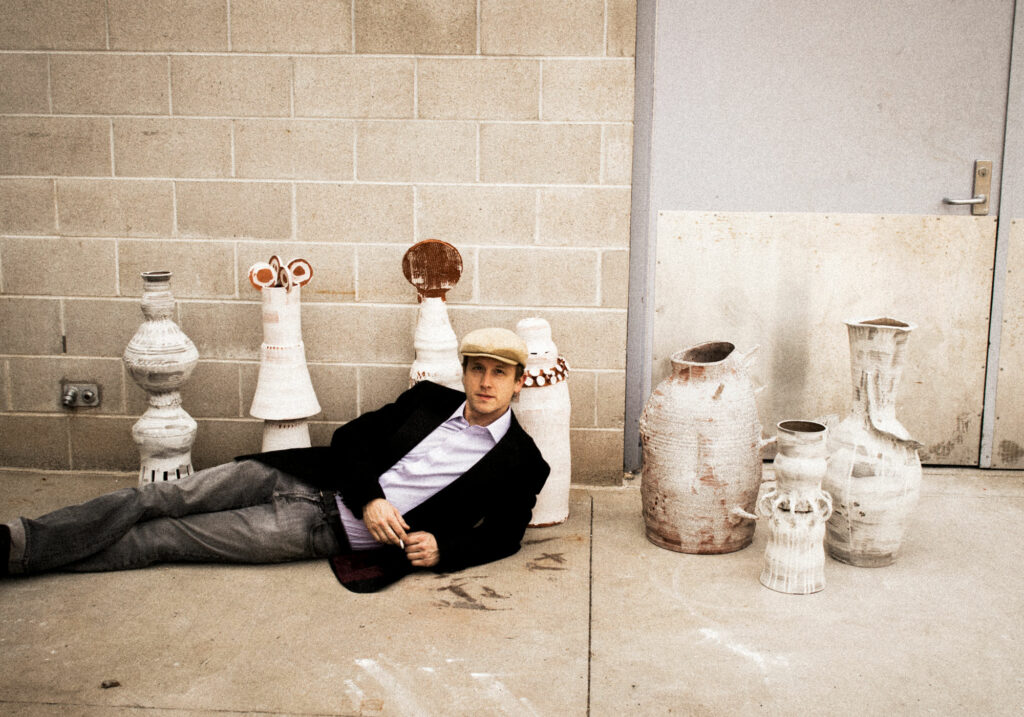
Interview
(based on actual questions from Joe Krasean studio visits during his time as a grad-student at the University of Minnesota)
So what are you working on?
I’m building a series of small to large ceramic vessels that will be accompanied by a photo book of semi-fictional ‘artist portraits.’ I have some kind of idea that I want to be a really productive ‘studio artist’ but I need to frame this activity in a way that alleviates me the embarrassment of showing handmade clay works. So I tapped into this idea of the portrait of the artist
working in his or her studio, which is a strong trope. I feel like I can dissolve my ‘identity’ as a ‘maker’ into these various guises, and just allow myself the space to make whatever the fuck I want. This ‘mode’ is very attractive to me—the artist as pure creative force. Who doesn’t want to make whatever pops into their head on any given day? This is the mode where we tap in to what people call ‘flow’ or whatever, and it’s a very energizing state. At the same time, I’m really skeptical of who this character is. Like, who has the right to do that? It’s such a macho stance. “Everything I touch is art. All I have to do is make it.” So I’m building these frames where the creativity and the analysis must be taken together.
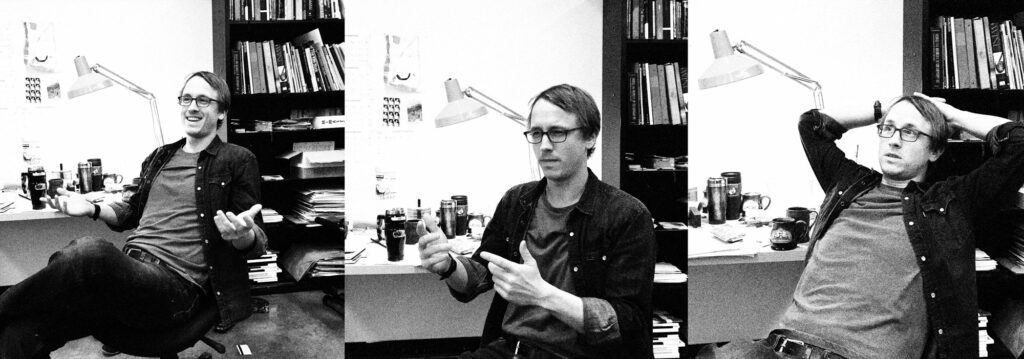
Where is the power in your work? And how do you communicate that visually?
I’m not sure how to answer that. I don’t know if there is any power in my work. I don’t feel like I have any power. I know I don’t have any money or free time. But I guess maybe you’re asking me about what people might see in my work or what they might ‘take away’ from the ‘experience’ of my work. Even that is such a weird question to me. You have to understand, first, that I don’t have any audience. There is literally nobody outside of school that’s thinking about what I do or waiting for my next show. So there’s this element to everything I’m doing that’s just pure speculation, or perhaps pure fiction. I have ideas that I think about and I have ideas about what I’m trying to put into the work, but it’s hard to say what the power of the work is with no real audience feedback. I think the strength of my work lies somewhere between a palpable physical vitality, a searching curiosity, an inviting humor, a latent critical edginess, and the raw seduction of forms in space. That would be a great byline. I’d love to read that someday—that somebody had written something like that about one of my shows. It’s more often the case that the things I’m putting into my work and the things I hear and see people reading from the work… these are often separated from each other. I don’t know if that’s a problem that needs to be solved or just something that’s endemic to our field. I also, truly, do not have much experience with audience feedback. Grad school has been great in terms of learning to talk about my work, or simply being forced to talk about my work with a greater frequency than I’ve ever experienced, but I’m also really hesitant to ascribe the force of truth or impartiality to my ‘audience’ from grad school. My student cohort and the professors that I work with all have different motivations and desires that they bring to a studio visit or critique and I’m often over-thinking about where their recommendations are coming from.
In terms of how I communicate all this visually, I must admit that I’m also a bit at a loss here. I feel like your question is reaching for some inquiry into synthesis, or how I ‘bring it all together.’ This is something I’ve always been pretty bad at. I have a lot of raw, creative energy, I have a small amount of skill that I can use, and I have an eye for novel ideas. But issues like exhibition design or clear communication of the ‘central’ idea always seem to escape me. I think some of it has to do with how much I tend to jump around. My astrology chart says something about how I start a lot of projects but don’t truly finish very much, and I think that sounds accurate to me. I’d like to get to this place in the future where everything is just so fucking tight, you know? Like these forms have to be these forms, because they come from these concepts, and the whole thing makes perfect sense, even if in some totally abstract way. The truth is that I’m just not there yet. I mostly have to the feeling that I’m lucky just to get the next idea for something I want to make. And it’s not as I have such exquisite control or virtuosic skill to pull off exactly what’s in my head. A lot of times in the studio, my actual production is something of a shit-show. It’s a strange process and, to say the least, I don’t have a ‘handle’ on the entire thing.
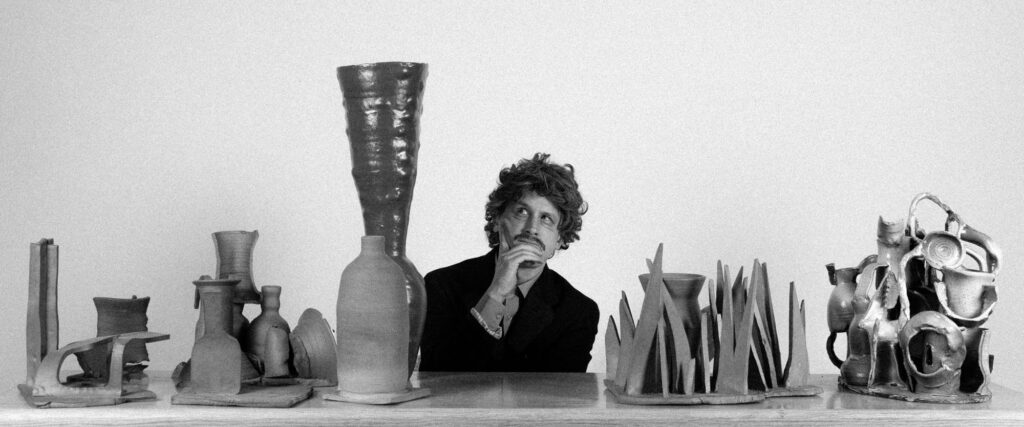
But what is your work about? I feel like we’ve been talking for almost two years, but I’m sitting here thinking, ‘here’s a guy who has no idea what his work is doing.’ That seems important to figure out at some point.
Shit man, that’s a really tough question. It makes me think like… my work must not be about anything if you have no entry point into the conversation. My work is about a lot of things. I’m not a ‘single-issue voter,’ you know? Not all the work is unified under a single flag either. Example: I have really strong ideas for an entire show that’s about language, or like that’s about when people lose language, like with aphasia or when people have a stroke or something. I want to make these little devices and images for people that have lost their language, that they could go into this gallery and feel some comfort or safety. Because I think Jesus that’s got to be such a crazy and fearful feeling when you open your mouth and the right thing doesn’t come out. So like I have these ideas that illustrate the very basics of language in abstract and loose ways, that can be manipulated by the viewer, and that could give people a new approach to thinking about communication. And what the hell is that whole idea about? My other ‘stuff’ isn’t really addressing the faculties of language directly you know? I mean, this fictional language show that I’m talking about has nothing to do with the history of modernism, the role of digital image making in contemporary art, the aura of the artist, studio practice and anti-practice, flow and anti-flow, or any of the things that my projects are usually about.
I want to be able to jump around and make convincing work in a variety of themes. This seems to run counter to my read of how most artists actually make a living, which is to establish a strong brand for themselves. Even artists who jump around a lot seem to brand themselves on the strength of their conceptual maneuvering. I don’t know if what I’m talking about is a personal character flaw and I’m just too flighty and like… it’s time for the rubber to hit the pavement, or if maybe, like, this ‘concept’ of the power of branding in the arts is going to become my brand somehow.
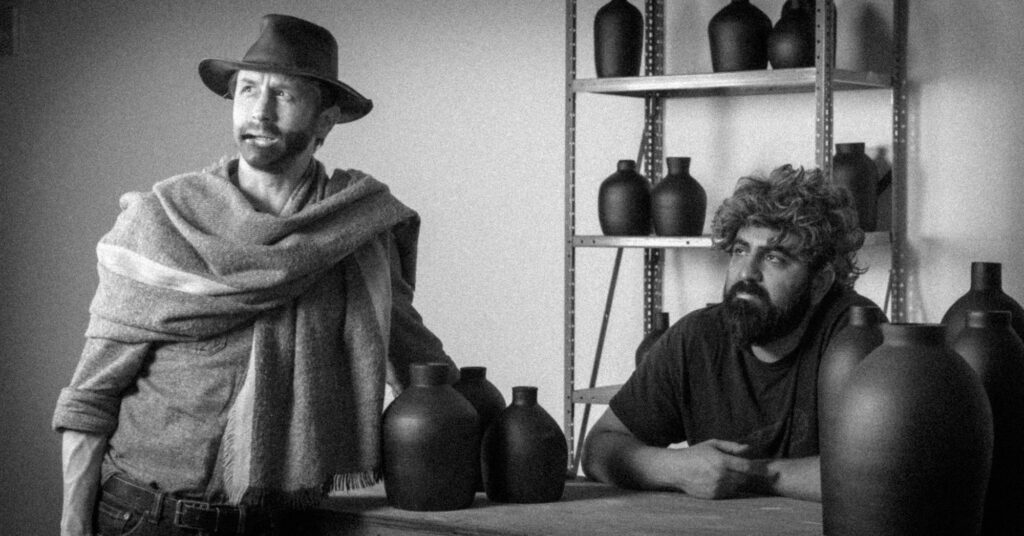
Why are you doing this?
You mean like, why am I making art at all? Jesus! You are really putting the screws to me this afternoon! No, it’s cool. I get it. I’ve read your stuff. I knew what I was getting in to [laughs]. You’re like the ‘tough questions’ guy. I don’t know, you know? I mean, the question of ‘why’ isn’t a super useful one to me. I’m really in a place right now where I’m desperate to get my hands on things that are useful in the studio. I’m looking for concepts I can mobilize, ideas that have green lights around them, forms that are screaming to me. It’s simply not useful for me to dive into the deepest, darkest reasons for why I think I should make art, or why I think I have the right to make art. I see, perhaps, that this could be useful at some point. Like, maybe if I dive in really really deep to the bottom of my motivations, I’ll see something golden or vanta-black or somehow really fundamental you know? Like—Oh! That’s who I am! But I’m not there yet. I could do some speculating about how I got on this career track, what choices I’ve made and what was in my past the indicated I might end up going for something like this. For example, when I was a kid, I was always really into the idea of being an artist. My dad gave me one of his old briefcases and I kept a bunch of drawings and tracing paper and markers and funny rulers and things in there. It was like a real treat for me to take the briefcase out and it was like, ‘now I’m going to make an art.’ Or I could talk about how deeply affected by color I was when I was a boy. I used to have insanely strong preferences for certain colors. And I grew up in the 90s, so there was like this explosion of these great neon colors. Everything was hot pink and hot green and hot blue. Everything was just fucking hot and these colors really had an influence on me. But I hate that stuff you know? I mean—I love those memories, but I hate it when artists use the ‘childhood memory’ card in their statements. I did a bunch of different things when I was a kid. I played sports way more than I did anything else, and I’ve never considered pursuing any of that stuff professionally. I don’t know, you know? Why? Why? Why am I doing it? Oh—I was a class clown too! So like, maybe my angle is that I’m a rule-breaker! Yeah that’s what it is—I’ve always been a natural rule-breaker! No seriously though, it’s not a huge mystery. Through dumb luck and a little hard work, I’ve somehow managed to string together an unlikely series of opportunities in the arts. Who wouldn’t do it if they could? It’s the best job in the world. I get paid to do this stuff? Sure, sign me up.
Did you see that new show from Fischli and Weiss?
Yeah it was killer. I mean, I wasn’t in New York or anything. I just read about it online and saw pictures. Those guys are hilarious geniuses. I hear this kind of thing in studio visits all the time. It’s always really hard for me. The question of artist influences… I’m constantly reading Artforum and Frieze and checking out gallery websites and talking about shows and artists with my friends and going to shows and the whole thing. Partially because I love this stuff and find it better than any other form of content-absorption, but also partially because I have these insecurities that I have to be able to say the right things about other artists during studio visits. So like… Fischli and Weiss? Absolutely. I think they are kindred spirits with what I’m doing. But influence is hard. Like, I’ve put a moratorium on myself against visiting their website anymore, because, like, I’m afraid I’m just ripping them off anyway and I’d rather not know it directly. That’s how it is for me with influence. You find someone doing something you love, and usually they’re doing it better than you. And that makes you insecure. Or you start to worry about stealing their stuff. And then you get resentful. I’m often more ‘influenced’ by artists I don’t like, or people that I think are doing it wrong. Then I can kind of activate my punk trickster side and start thinking of ideas that go against those terrible things. But then you start to feel like an asshole and you start thinking, ‘you know, art is supple. You can’t kill this field. It’s big enough for everyone. All artists are good artists. We’re all cooking with water. You should respect everyone’s efforts.’ And that whole line of thought. I have to be really careful looking at other people’s stuff because I get caught in these loops. I love reading about these historical groups of artists that were working together under a common flag. The New York painters, the minimalists, the YBAs, and on and on. How great would that be? To get caught up in a media summary of your moment? Then you’re not worried about influence, you just read articles about how influential you are!
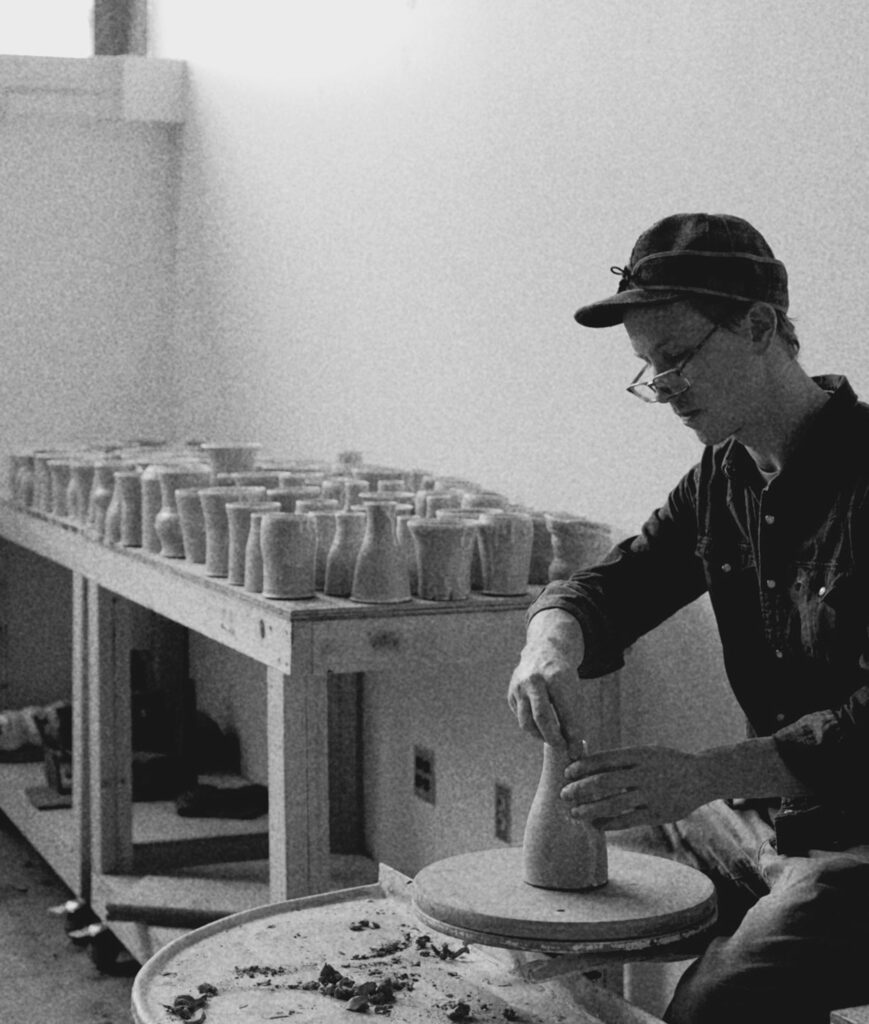
Your studio looks like a hobby room. Is art just another hobby for you?
Yeah maybe! Sometimes it feels like it. But it’s a pretty serious hobby if it is one. I put a lot a lot a lot of hours into this stuff. But you’re right, my studio is a total man-cave/fantasy fort room. I do have a lot of hobbies or interests. I have guitars in my studio. I have keyboards and drum machines. Face paint. Popsicle sticks. Brushes. I don’t even paint anything and I have a ton of brushes. Books. Not all of them art books. Pictures and photos from friends. Tobacco and beer. Dicks. There’s a ton of dicks in my studio. People around the studio think it’s really funny to come to Joe’s studio and make dicks out of clay. And I think it’s funny too. I make a lot of dicks. Camping supplies, a sleeping bag and camping mat for studio naps. Clothes and shoes. Stuff from thrift stores. It isn’t like this Bruce Nauman ‘studio as chaos’ thing either. I have things neatly arranged on shelves. It looks like some suburban parents’ basement rec room or something. You know, I grew up in the suburbs. Our childhoods were completely focused on hobbies. We were all encouraged to just have a bunch of hobbies and pursue all of our little unique interests and have a variety of activities to keep us busy because there was no such thing as a common, civil society. It was just weird parents’ houses and yards. But there we go again with the childhood-memory justification [laughs]. No but for real though I have no idea what I’m doing. I don’t know the right way for me to create a studio. I don’t know the ideal conditions that nurture my creativity, or like what distractions need to be excised and which ones are healthy. The studio has numerous functions for me though. In some ways it’s like a pressure-release valve on my home life. I can keep a really clean, quiet, sort-of minimalist living space if I have a studio. You just export all that wacky activity stuff to the studio, let it get messy, and keep the home life clean and tidy. I don’t know… it’s a work in progress, you know? I’m open to suggestions. I change the studio a lot. I move studios. I think it’s healthy to throw a lot stuff away, including work that’s been sitting around too long. I think the important thing for me is that it keeps moving. Things can stagnate. There’s a pretty big Venn diagram overlap of artists and hoarders.
So, getting back to the work, I keep wondering about your formal choices? Like, I’m looking at the work and I keep seeing the same gesture, and it’s a limited gesture. I’m wondering how you can take that further, or what could you do to specify the formal choices in a way that supports your ideas?
Again with the formal choices stuff! Yeah, you keep seeing the same gesture because I’m not that good maybe! I have limited skills. Especially with the clay stuff. I’ve been doing clay for 16 years and I’m just getting to the point of medium-good. I can’t do anything I want with this material. I’m really limited by my skills. I have enough skills to do some stuff though, and that’s what’s on display here. There’s another aspect to your question though, which has to do with the idea of distinction, or of distinguishing yourself through your formal choices. This touches on the idea of style or signature. And then we’re getting in to branding territory. Every time I start to see my moves coalesce into a discernable signature, I abandon that technique immediately or actively try to pervert it. Maybe it’s just a tic, but I don’t want to be defined by formal style. One of the dangers is that you produce something marketable, and then if you switch ‘styles,’ your audience grows restless. The bigger danger though is that we’re just replicating the horrors we see in advertising and retail design. As artists, we have to be able to do things that retailers cannot do or unwilling to do. I take a lot of strength from certain musicians in this respect. Like Bowie made massive changes throughout his career and it was only when he died—rest his soul—that we could begin to summarize or understand his contributions as a style or brand. He kept us off balance. He took chances and made it inviting for us to follow him down new roads. REM same, Radiohead same, MF Doom same. For some artists, the idea of style is so natural and so much part of who they are, that they can’t help but be themselves no matter what they do. Like, Johnny Cash was Johnny Cash no matter what he touched. Or there are like style virtuosos who have such a crystalline vision that they just… they can let the concept of style carry them. Like Ron Nagle is just a style master and I love his work. But that’s not me at all. On the plus side, I have no moratorium on looking at Ron Nagle stuff. There’s no danger for me there and I look at his stuff all the time [laughs]!
You came up in a conversation the other day about ‘criticality,’ and we said that somehow your work has that ‘tag’ on it. But I thought about it and I couldn’t really figure out why.
Hey I’ll take it if somebody’s talking about my work without me prompting them! I don’t think you meant to compliment me though [laughs]. Yeah I don’t know. I guess I have a reputation for ranting sometimes. I have a lot of problems with art as a field [laughs]. I can certainly be ‘critical.’ But tone is something I’ve been thinking a lot about lately. I became aware of how quickly critical insight can turn into cynicism or just snarkiness. And I don’t want to be that guy. I think I have a sarcastic edge, but I hope there’s something stronger that carries through in my work. I think overall I’m a pretty positive dude and I try to put a real sense of energy and vitality in my work. I think the humor can be inviting in my work, but it also can carry a little edge to it that people might read as dismissive or glib. I don’t know what to say. Jokes are a very frequent starting place for me. I’ll think, ‘oh it would be hilarious if someone did a project that skewered X.’ And then I’ll sit on it for a while until I’m like, ‘I’m doing that project.’ It’s fun. It’s often fun and I start from a place of amusement. Or bemusement. But I’m also steeped in critical theory. I’m not a scholar in that field, by any stretch. I’ve worked with scholars in that field and those people are sharp! I mean, people that are really in that field can take apart a text and put it back together. They can reach back through generations of influence and give shape to different schools of thought and show what’s at stake in each of them and how all these different schools of theory are not mutually compatible. They can remember quotes! I don’t do anything like that. But I’ve read some stuff and I can talk some theory. A lot of artists I know are allergic to reading so I’m like the theory guy or something, but seriously I’m a hack. But seriously, read Society of the Spectacle and tell me it’s not the most accurate diagnosis of our moment that you’ve ever seen on paper. Or read Mythologies and try to watch TV in the same was as before. For me it’s another one of those things on the scale of content-absorption that skews towards the ‘actually good’ side. It makes me feel less lonely. But I don’t want to be this theory-artist who just has every project locked up airtight because it’s all ‘supported’ or something. There’s got to be room in art for sheer strangeness and abstraction or just dark poetry. So yeah, I guess if you were talking about me and wondering how on Earth I came to be associated with critical art, you were probably just thinking I’m an asshole. Maybe that’s my thing. I just want to figure out how to be a huge asshole but still have people think I’m a really nice guy.
Well thanks, that was a good talk.
Thank you! I think so too! Thanks for coming. Do you want to buy anything?
